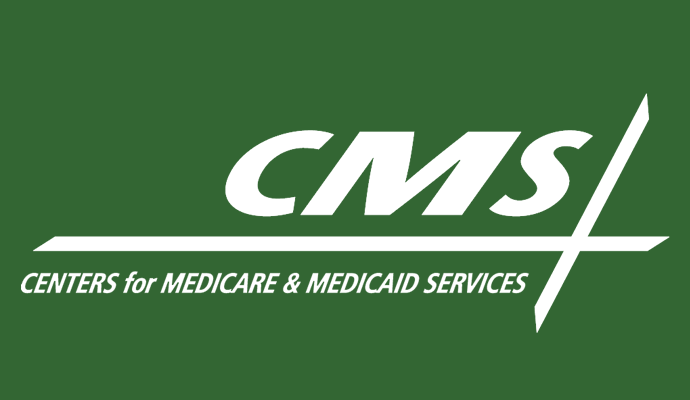CMS Proposes Payment Cuts in CY24 Medicare Physician Fee Schedule
In addition to payment cuts, the agency proposed changes to the Quality Payment Program and the Medicare Shared Savings Program.

Source: CMS Logo
- CMS has proposed payment cuts in its calendar year (CY) 2024 Medicare Physician Fee Schedule (PFS), including a 3.34 percent decrease to the conversion factor that would reduce payment rates by 1.25 percent.
The proposed CY 2024 PFS conversion factor is $32.75 compared to $33.89 in CY 2023. This change reflects the end of the 2.5 percent statutory payment increase for CY 2023, a 1.25 percent statutory payment increase for 2024, and a 2.17 percent reduction for budget neutrality.
The agency has said that proposed payment increases for primary care and other direct patient care providers meant that payment cuts must occur in other specialties to achieve budget neutrality. While specialties like internal medicine (1 percent) and family practice (3 percent) would see reimbursement increases, others are facing cuts, including radiation oncology (-2 percent) and emergency medicine (-2 percent).
The rule included a proposal to implement a new add-on code to recognize the costs associated with evaluation and management (E/M) visits for primary care and longitudinal care of complex patients. The code would result in additional payments to providers for outpatient office visits.
CMS also proposed additional payments for caregiver training services and separate payments for services that address health-related social needs when community health workers, care navigators, and peer support specialists are involved.
Provider organizations have decried the proposed payment cuts.
“Medicare already largely fails to cover the cost of furnishing care to beneficiaries, and the proposed cut to the 2024 conversion factor compounds the problem. Implementation of a new add-on code (G2211) for complex patients highlights CMS’ flawed approach to addressing inadequate Medicare payments for primary care services using a budget neutral methodology,” Anders Gilberg, SVP of Government Affairs at MGMA, said in a statement emailed to RevCycleIntelligence.
“Congress must reexamine existing law to provide an annual physician payment update commensurate with inflation and do away with Medicare’s ‘robbing Peter to pay Paul’ budget neutrality requirements to provide much-needed financial stability for medical practices.”
The American Society for Radiation Oncology (ASTRO) also expressed concern with the PFS.
“The ongoing cuts to radiation oncology reimbursement, coupled with broader cuts to Medicare services, threaten to decrease patients’ ability to receive vital, high-value cancer care close to home by driving practice consolidation and undermining the viability of smaller practices. These cuts also underscore the need for long-term, overarching reimbursement reform that will ensure patients can access the care they need,” Geraldine M. Jacobson, MD, MBA, MPH, Chair of the ASTRO Board of Directors, said in a statement.
The proposed rule also included changes to the Quality Payment Program (QPP) and the Medicare Shared Savings Program (MSSP).
For the QPP, CMS proposed five new optional Merit-based Incentive Payment System (MIPS) Value Pathways for reporting:
- Focusing on Women’s Health
- Quality Care for the Treatment of Ear, Nose, and Throat Disorders
- Prevention and Treatment of Infectious Disorders Including Hepatitis C and HIV
- Quality Care in Mental Health and Substance Use Disorders
- Rehabilitative Support for Musculoskeletal Care.
The agency also proposed to increase the quality data completeness threshold and the performance threshold score that MIPS participants must achieve to see positive payment adjustments.
For MSSP, CMS proposed changes that shift accountable care organizations (ACOs) toward digital quality measurement by establishing a new Medicare Clinical Quality Measure (CQM) collection type.
The rule also included amendments to the financial benchmarking methodology. ACOs will be able to apply the same CMS-Hierarchical Condition Categories risk adjustment methodology to both the benchmark and performance years, minimizing the impact of negative regional adjustments on the benchmark.
“[CMS] showed its commitment to supporting value-based care and growing participation in accountable care organizations in this proposed rule,” Clif Gaus, ScD, president and CEO of the National Association of ACOs (NAACOS), said in a statement. “It addresses several issues that NAACOS has been advocating for, including improvements in quality reporting, more fair benchmarking policies, a smooth transition to a new risk adjustment model, keeping advanced payments for new ACOs who transition to risk, helping ACOs who serve high-cost beneficiaries and others.”
The proposed rule also included provisions to improve access to behavioral healthcare services and expand telehealth waivers.
